
UCLouvain or Université catholique de Louvain is Belgium's largest French-speaking university. It is located in Louvain-la-Neuve, which was expressly built to house the university, and Brussels, Charleroi, Mons, Tournai and Namur. Since September 2018, the university uses the branding UCLouvain, replacing the acronym UCL, following a merger with Saint-Louis University, Brussels.
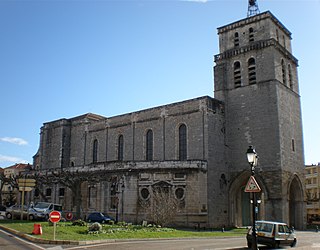
Alès is a commune and subprefecture in the Gard department in the Occitania region in Southern France. Until 1926, it was officially known as Alais.

Maurice Marie Émile Leblanc was a French novelist and writer of short stories, known primarily as the creator of the fictional gentleman thief and detective Arsène Lupin, often described as a French counterpart to Arthur Conan Doyle's creation Sherlock Holmes.

Adrien Albert Marie, Comte de Mun, was a French political figure, nobleman, journalist, social reformer, and reactionary of the nineteenth century. Born into a noble family de Mun joined the French army at a young age serving during the French conquest of Algeria, the Franco-Prussian War and the suppression of the Paris Commune. A devout Catholic, de Mun became interested in Catholic Social Teaching while he was a prisoner of war in Germany.

The Archdiocese of Paris is a Latin Church ecclesiastical jurisdiction or archdiocese of the Catholic Church in France. It is one of twenty-three archdioceses in France. The original diocese is traditionally thought to have been created in the 3rd century by St. Denis and corresponded with the Civitas Parisiorum; it was elevated to an archdiocese on October 20, 1622. Before that date the bishops were suffragan to the archbishops of Sens.

Cercle Proudhon was a national syndicalist political group in France. The group was inspired by Georges Sorel, Charles Maurras and a selective reading of anarchist theorist Pierre-Joseph Proudhon.

The Compagnie des chemins de fer de Paris à Lyon et à la Méditerranée, also known as the Chemins de fer Paris-Lyon-Méditerranée or simply PLM, established in 1857, was one of France’s main railway companies until the nationalization of all French railways and establishment of the Société nationale des chemins de fer français (SNCF) on 1 January 1938.

Noctilien is the night bus service in Paris and its agglomeration. It is managed by the Île-de-France Mobilités, the Île-de-France regional public transit authority, and operated by RATP and Transilien SNCF.
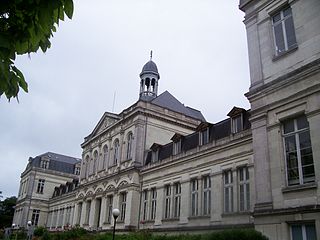
The Catholic University of the West, also known as UCO or colloquially as la Catho, is a university located in Angers, France.
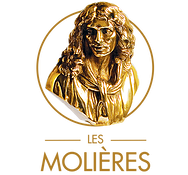
The Les Molière is the national theatre award of France and it recognises achievement of French theatre each year. The awards are considered the highest honour for productions and performances. Presided and decided by the Association professionnelle et artistique du théâtre (APAT), supported by the Ministry of Culture in a ceremony annually held, called the Nuit des Molières in Paris.

The Fédération Indochinoise des Associations du Scoutisme was the earliest Scouting governing body in French Indochina, encompassing several smaller Cambodian, Laotian, and Vietnamese Scout associations, open without bias of faith or political viewpoint, from 1930 to 1954. The federation spawned, then later devolved into, the Scouts Lao, the Hội Hướng Đạo Việt Nam and the Angkar Khemarak Kayarith.

The Chemin Neuf Community is a Catholic community with an ecumenical vocation. Formed from a charismatic prayer group in 1973, it has 2,000 permanent members in 30 countries, and 12,000 people serving in the community missions. Its main founder is the Jesuit father, Laurent Fabre.
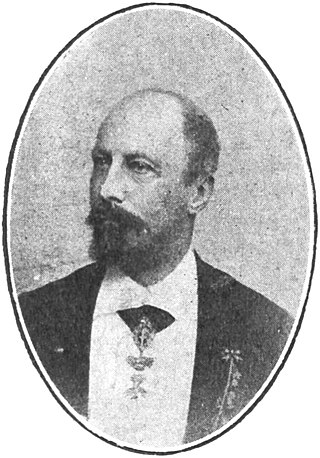
Charles-Humbert-René de La Tour du Pin Chambly de La Charce, was a French military officer, politician and social reformer.
Maurice Maignen, (1822–1890), was a French Social Reformer and a Roman Catholic Religious Brother during the nineteenth century. He was the founder of the Catholic Circle of Montparnasse to prevent future tragedies from happening, like the Paris Commune.

The Oblate Sisters of St. Francis de Sales are a congregation of Roman Catholic Religious Sisters who base their spirituality on the teachings of St. Francis de Sales and St. Jane de Chantal.
The Chronique Sociale is a French organization founded in Lyon in 1892 to publish what became an influential organ of Catholic social activism. From 1904 the publishers began arranging annual study weeks where Social Catholics could meet and exchange ideas. The parent organization continues to promote training and education about social cooperation, and a related limited company publishes books.
The Prix du Brigadier, established in 1960 by the Association de la Régie théâtrale (ART), is an award given to a personality from the world of theater.
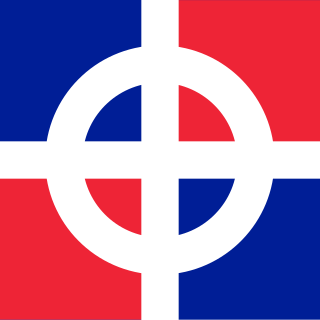
L'Œuvre Française, also called L'Œuvre, was a French nationalist, néo-Pétainist and antisemitic far-right movement founded in 1968 by Pierre Sidos. Inspired by the "semi-fascist" regimes of Vichy France, Francoist Spain and the Estado Novo, L'Œuvre Française was—until its dissolution by the authorities in 2013—the oldest nationalist association still active in France.
Yvan Benedetti is a French far-right activist. The former president of L'Œuvre Française (2012–13), he has been the spokesman of The Nationalists since 2015.

Parochial patronage refers to several Catholic and Protestant organizations initially dedicated to the popular education of underprivileged young people. Such institutions appeared in various European countries at the end of the 19th and 20th centuries - in particular, under the name of Orel in the provinces of the Austro-Hungarian Empire – but the term "patronage" remained closely associated with Belgium, and even more so with France, where Catholic patronages were founded in Marseille at the end of the Consulate by Abbé Jean-Joseph Allemand. Abbé Timon-David later took up the idea, and then widely developed within congregations such as the Brothers of the Christian Schools, Jean Bosco's Salesians, Frédéric Ozanam's Brothers of Saint Vincent de Paul and the Dominican Third Order in the early 20th century.















